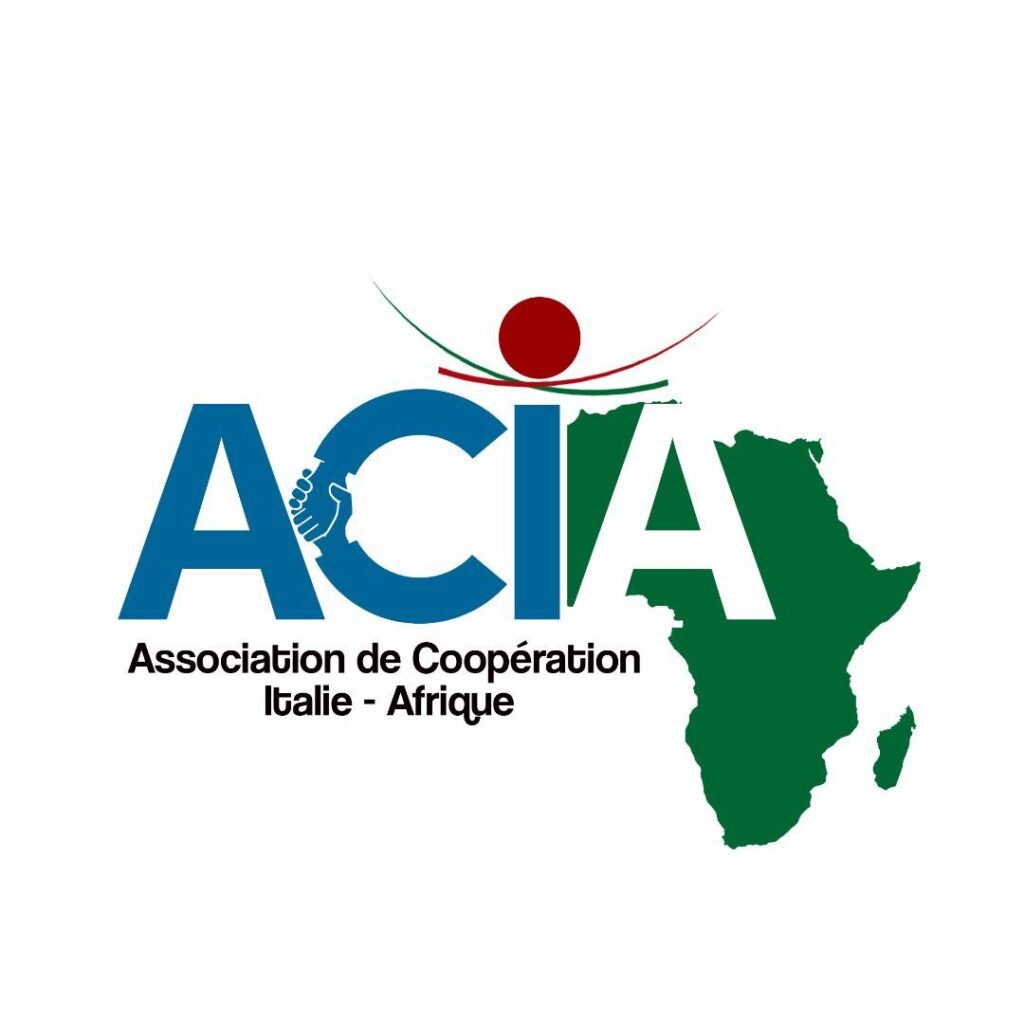
Presentation of ACIA - Italy-Africa Cooperation Association
L'ACIA (Italy-Africa Cooperation Association) is a non-profit, non-partisan and secular organisation, founded in accordance with Burkinabé law no. 064-2015/CNT, with the aim of strengthening ties between Italy and the African continent through multilateral cooperation projects. Based in Ouagadougou (Burkina Faso), the association works to promote socio-economic, cultural and diplomatic development, acting as a bridge between the two continents.
Mission and Objectives
ACIA commits itself to:
- Promoting sustainable development: Fighting poverty, supporting youth and children, and fostering leadership, peace and security through targeted projects.
- Fostering economic partnerships: Creating a platform for collaborations between Italian and African companies, organising events such as the 'Africa Investment Days' and economic forums on both continents.
- Strengthening cultural and diplomatic tiesPromoting twinning, institutional relations and initiatives such as 'parish diplomacy' to foster intercultural dialogue.
- Supporting the 2030 AgendaCollaborate on international cooperation projects focused on the Sustainable Development Goals (SDGs), with a focus on education, health and technological innovation.
Structure and Governance
- Decision-making bodies:
- General AssemblyThis is the supreme body that meets every two years to deliberate on activities, renew the Executive Council and appoint honorary members.
- National Executive Office (BEN)Composed of 4 members elected for a 2-year term, renewable, led by the
- President Dr. OUEDRAOGO Boukary,
- Secretary General Louis Michel Nekam
- Treasurer DALMEIDA POMPEO.
- Members: Includes active members (with voting rights) and honorary members (exempt from membership fees), with voluntary and free membership.
Initiatives and Collaborations
- Economic forums: In November 2024, ACIA organised a forum to connect Italian companies with African business delegations, focusing on agribusiness and investment.
- Participation in institutional events: He cooperates with Italian institutions such as the Municipality of Rieti, where he met Mayor Sinibaldi to discuss trade exchanges within the Mattei Planpromoted by the Italian government for cooperation with Africa.
- International synergiesAffiliated to AEDIC Consulting, a network that supports investments in Africa with tax benefits and expert advice, ACIA benefits from bilateral partnerships for development projects.
Impact and Future Vision
ACIA is part of the Mattei Plan, an Italian strategy that aims to consolidate cooperation with Africa through investments in infrastructure, education and the green economy 89. The association aims to:
- Expanding twinning between Italian and African cities, as demonstrated by the invitation to participate in the World Chilli Pepper Fair in Rieti in 2025 4.
- Promoting a model of 'non-predatory' cooperation based on mutual respect and fair exchange of expertise.
- Tackling global challenges such as irregular migration by focusing on local development and vocational training.
Conclusions
ACIA is a key player in the Italian-African cooperation landscapecombining economic pragmatism, social commitment and cultural sensitivity. With a solid structure and an SDG-oriented vision, the association positions itself as a catalyst for a future of shared growth, responding to the needs of both continents.
For further details on activities or collaborations, please consult the statutory documents or contact the organisation directly.
STATUTO
TITLE 1: GENERAL PROVISIONS
Chapter 1: Constitution, name, duration, seat
Article 1: In accordance with Law No. 064-2015/CNT of 20 October 2015 on Freedom of Association, an association under Burkinabe law was created.
An association under Burkinabé law called: ITALY AFRICA COOPERATION ASSOCIATION in short ACIA.
Article 2: This association is apolitical, secular, non-profit and not
denominational. Any form of discrimination is forbidden within it,
Article 3: The duration of the association is unlimited,
Article 4: The headquarters of the association is in Ouagadougou and can be transferred to any other place in the national territory by decision of the majority of its members,
Chapter II: Aims, Objectives
Article 5: The ultimate goal of the association is to promote cooperation between trade associations.
the peoples of Africa and Italy through multifaceted assistance,
Article 6The association pursues the following objectives
+ Supporting the socio-economic development of young people, combating poverty, promoting the well-being of children and adolescents.
Support the socio-economic development of young people, fight poverty, promote leadership, peace and security;
+ Establish an economic partnership platform between Africa and Italy;
+ Promoting parish diplomacy, twinning and cultural relations between Africa and Italy.
Promoting diplomatic relations, twinning and cultural relations between Africa and Italy;
+ Establish an international centre of expertise, consular support for the implementation of
Establish an international centre of expertise, advisory support for the implementation of international decentralised cooperation projects focused on the 2030 Agenda and the SDGs.
= Organising national and international events with high added value for investment promotion in Africa.
Investment promotion in Africa 'Africa Investment Days'as well as organising economic forums in Italy and Africa,
Chapter III: Rights and Duties
Article 7: Each member of the association has the right :
+ Express their opinion on the life and activities of the Association;
Hold a membership card;
+ To be informed about the life and activities of the Association.
+ Being an elector and eligible for election to the Executive Board (EB);
+ Resign from the association at will.
Article &: Every member of the Association has a duty:
+ Participating in meetings and general assemblies of the association;
+ Actively participate in association activities;
+ Pay membership fees and monthly dues;
+ Observe discipline and respect the fundamental texts of the Vassociation;
- Respect the decisions or sanctions taken by the General Assembly (GA);
+ Defending the image and interests of the Association.
Article 9: Any natural or legal person working in the field of culture and development
development, enjoying all his mental faculties, his civil rights, and having reached the age of
civil rights, and having reached the age of civil majority, without distinction of age, sex
ethnicity or religion.
Membership is individual, free and voluntary.
Article 10: Loss of membership status occurs due to
A member's resignation must be addressed in writing to the President of the Association;
The death of the partner;
Removal of the member for serious reasons.
Article 11: The association consists of active and honorary members.
+ Active or adhering members are those who are in good standing with their membership and payment of dues.
and actively participate in the association's activities and other meetings.
They have the right to vote.
An honorary member is a person designated as such by the General Assembly.
as such. Honorary members are exempt from paying membership fees and do not have voting rights.
Article 12: The organs of the association are
+ The General Assembly ;
+ The National Executive Office;
Article 13: The General Assembly
The General Assembly is the supreme organ of the association. It brings together all members of the association and meets once a year.
members of the association and meets in ordinary session every two years, or during the first working session.
The General Assembly is convened by the President of the Association. It is convened by the President of the National Council.
National Executive Committee (NEB).
It examines and deliberates on the items on the agenda.
It proceeds to the renewal of the Executive Council at the end of its term.
mandate
Imposing sanctions on members, appointing honorary members
councillors, deliberates on items on the agenda and also elects the auditors.
Decisions of the General Assembly are taken by absolute majority. In the event of a tie, the vote of the President prevails.
of votes, the President's vote is decisive;
It will meet in extraordinary session at the request of two thirds (2/3) of the active members in good standing in the event of an emergency or according to its own agenda.
Article 14: The National Executive Bureau (BEN) is chaired by its president.
It consists of four (04) members elected by the General Assembly by vote and show of hands or by secret ballot or by simple majority of those voting for a two (02) year term, renewable for a second (02) year renewable term.





